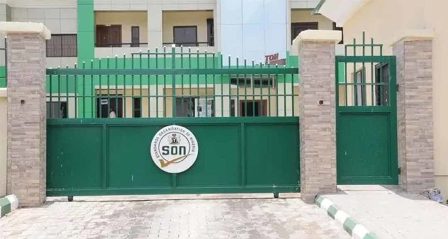Business
SON Shuts 13 Steel Firms For Standards Infractions

The Standards Organisation of Nigeria National Steel Task Force has sealed 13 steel factories across the nation for standards infractions.
The Chairman of the SON Task Force on Steel, Enebi Onucheyo, said the companies located in Lagos, Ogun, Osun, Abia and Edo states would be shut indefinitely following a nationwide market surveillance carried out by the SON Task Force between November 2019 and January 2020.
He stated that samples of various steel products were obtained from the open market as well as the facilities of the companies during the surveillance exercises.
Onucheyo stated that given the SON classification of steel bars as life-endangering products, the Nigeria Industrial Standards provides for unique identification marks for every locally manufactured or imported steel bars for easy traceability.
According to him, laboratory tests and analysis carried out on the samples revealed that most of them failed to meet the minimum requirements for 2 diameter2 and 2 mass per meter2 as provided in the Nigeria Industrial Standard (117:2004).
These, Onucheyo said, were critical parameters in the standard for reinforcement bars for concrete.
Onucheyo said the shutdown exercise followed earlier warnings to all the steel manufacturing companies on observed infractions with directives to ensure strict compliance with the requirements of the NIS 117:2004.
The task force chairman disclosed that some of the companies were found to have tampered with products earlier placed on hold by SON in their facilities while an unregistered identification mark was discovered in one of the products sampled.
He explained that the exercise would be a continuous one in furtherance of the SON commitment to protect Nigerian consumers from the dangers associated with substandard and life-endangering products in view of the incessant collapse of buildings and structures across the country.
Onucheyo said the exercise was also aimed at ensuring that Nigerian consumers got maximum value for their money.
Commenting on the standards enforcement activity, the SON Director General, Osita Aboloma, restated the need to promote quality made-in-Nigeria products preparatory to the implementation of the African Continental Free Trade Agreement.
Business
Nigeria’s ETF correction deepens as STANBICETF30, VETGRIF30 see 50% decline in a week

Business
BOI Introduces Business Clinic

Business
Dangote signs $400 mln equipment deal with China’s XCMG to speed up refinery expansion

-
Maritime6 hours ago
Customs Declares War Against Narcotics Baron At Idiroko Border
-
Maritime6 hours ago
NIMASA,NAF Boost Unmanned Aerial Surveillance For Maritime Security
-
Maritime6 hours ago
Nigeria To Pilot Regional Fishing Vessels Register In Gulf Of Guinea —Oyetola
-
Maritime6 hours ago
NIWA Collaborates ICPC TO Strengthen Integrity, Revenue
-

 Business6 hours ago
Business6 hours agoBOI Introduces Business Clinic
-
Maritime6 hours ago
NIMASA GETS NEW MARITIME GUARD COMMANDER,ADOKI
-
City Crime2 hours ago
NCSU Hails Fubara Over 2025 New Telegraph Man Of The Year Award
-

 Business6 hours ago
Business6 hours agoDangote signs $400 mln equipment deal with China’s XCMG to speed up refinery expansion

